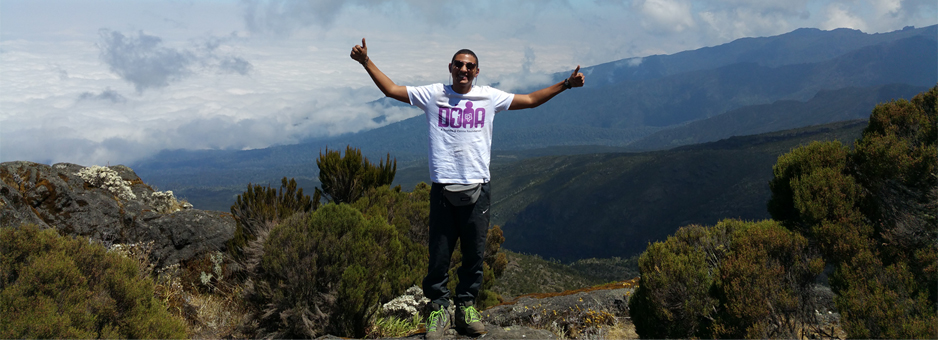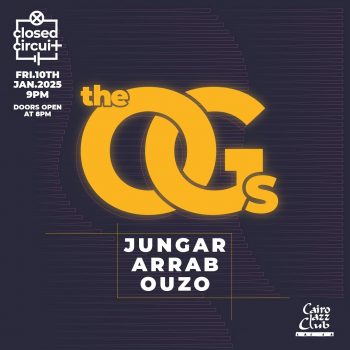On Monday 1st of August, at 7.31AM, a tired Mahmoud Hussein embraced the Uhuru peak sign atop Mount Kilimanjaro while proudly raising a flag bearing the name ‘Doaa’, becoming one of the youngest Egyptians to climb Africa’s tallest mountain at the age of 21.
Mahmoud had taken six days to reach the summit, but his journey to that point was much longer, going back to 2012 when he was diagnosed with ulcerative colitis – a disease that would see him misdiagnosed, spend over a year in-and-out of hospitals and endure a two-part 24-hour surgery. At his worst, he weighed less than 35kg.
I’ve known Mahmoud since early 2015 and when he would tell me about his ambitions in mountaineering, I always wondered (but never dared ask) why? I get the man-versus-nature, standing-on-top-of-the-world thing. But I always wondered, suspecting that not even Mahmoud had a definitive answer.
I wondered because it didn’t really fit. Mahmoud, in the first few months of knowing and working with him, was, by my estimation, a very decent guy; polite, generous, empathetic, good to his mother, plays with dogs when comes across them – a nice guy. I very quickly came to know, however, that there was much more to him; and now I completely and utterly understand his motions in mountaineering.
The vanilla ‘nice guy’ image I had put together was actually a step up from my first impression of him. When I first laid eyes on Mahmoud as the newest member of the Cairo Gossip team, I saw an awkward, skinny kid wearing an obnoxiously bright pink t-shirt, overly-ripped, light-coloured acid jeans and a chain around his neck.
Almost two years on, I consider him a close friend and he’s come along from the skinny, shy guy I first met. His dress sense has improved a little, too, but his love of exploration and mountaineering has only grown, especially now that he’s conquered his first of the Seven Summits.
“I took the Machame Route,” he told me, both proudly and a little regretfully. “They call it the ‘Whisky Route’, because it’s the toughest one,” he continued, going on to explain that he didn’t actually know that he was taking the toughest route and had chosen it because it was the cheapest.

As if climbing an almost 6,000 metre mountain wasn’t enough of a challenge, though, he had to contend with an upset tummy.
“I got food poisoning on the third day. I was throwing up constantly and couldn’t eat anything,” said a noticeably skinnier Mahmoud.
Drugged up to his eyes with medication and suffering the expected altitude sickness, Mahmoud’s guide and travel-partner didn’t think he would make it.
“My guide helped me as much as he could, but he and the other guides were worried. There had been two deaths over the month before I went up and they didn’t want a third.”
Just to compound things even further, Mahmoud was, admittedly, in poor shape going into the trip, suffering back issues that didn’t allow him to train for two months before making the trip to Tanzania.

As much as the cards were stacked against him, though, this was nothing compared to what he endured in 2012 when he was eventually diagnosed and treated for ulcerative colitis – a disease that got hold of his large intestine, twisted it, turned it, beat it and battered it, before eventually spitting out through a full colostomy. To put that in layman’s terms, Mahmoud was diagnosed at 17 and had his whole large intestine removed at 18.
“It was the worst pain I’ve ever and probably will ever feel,” Mahmoud says with a blank face, mentioning that, for some time, he walked around with a colostomy bag attached to his midriff – even at his prom.
Even when Mahmoud was eventually diagnosed with UC, he was told that, in spending a maximum of two weeks in hospital and making some adjustments to his diet and lifestyle, he would learn to live with the incurable disease. As his condition worsened by the day, though, that two-week stay turned into a two-month stay and it was eventually discovered that Mahmoud had the most severe form of the disease.
In short, ulcerative colitis, and the similar Crohn’s disease, begins with the immune system mistaking food and bacteria for foreign, hostile substances and sending white blood cells to the lining of intestines, where they produce inflammation and ulcerations.
“My days in the hospital were miserable. I went to the bathroom every 20 minutes and vomited anything I ate. But after my surgery, it was agony,” he explains.

“I woke up in pain. Any little movement would set it off. About an hour after I woke up, the doctor made me walk. I took the most painful eight steps of my life,” he told me, before going on to joke about how his friends and family would be walking around with him in the hospital, each carrying some kind of medical apparatus attached to him.
“I had an IV drip on one side, a catheter on the other – I was afraid to touch anything in case something went wrong.”
The fact that Mahmoud was initially diagnosed speaks volumes about the lack of awareness of Crohn’s and ulcerative colitis in Egypt. It’s something that took a toll on Mahmoud’s mental state.
“When I felt at my lowest, there was no one I could turn to or that understood what I was going through.”
So dejected by this was Mahmoud, that when he came to learn that the 10 year-old son of one of his mother’s friends was also diagnosed with UC, he found the opportunity to be the person to turn to. But he was faced with the stark reality of his own condition before he could even meet with the boy.
“I was ready to meet him, but my mum didn’t think it would be a good idea,” Mahmoud explains. “At that, time I had lost a lot of weight, I had the colostomy bag attached to me and I was just in bad shape; she told me that maybe it wasn’t the best idea for him to see me like that. She had a point. I didn’t want him to see what his future could turn out to be.”







